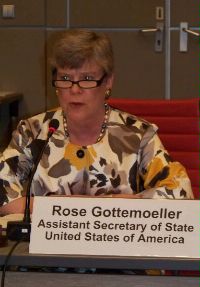

Good afternoon Excellencies, Ladies and Gentlemen. It is an honor for me to join you for the final day of the Second Review Conference for the Open Skies Treaty. First, I want to thank my colleague, Deputy Assistant Secretary of Defense Wallander, for taking over the Chair on the first two days on rather short notice. I wish I could have participated in the entire conference, but I was asked to testify before the Senate yesterday on the New START Treaty.
I understand that your discussions this week have confirmed the commitment of all delegations towards the future implementation of the Treaty. The United States, as the originator of the concept, is quite proud of the collective achievement demonstrated during the five years since the previous Review Conference, as well as since the entry into force.
Today, I would like to take the opportunity to reaffirm to all States Parties, the commitment of the United States toward continued robust implementation of the Treaty. The United States believes that it is essential for the Open Skies Treaty to remain a vital instrument in our Euro-Atlantic conventional arms control toolbox.
As U.S. Vice President Biden said on May 6 regarding advancing Europe’s security, “First, we need to work together to broaden our commitments to reciprocal transparency about all our military forces, including both conventional and nuclear forces, and other defense assets in Europe, including missile defenses.” The Open Skies Treaty is one of our most successful and valuable regimes to fulfill this task. In this regard, Open Skies serves not only its members, but the security of all OSCE participating States as well.
The United States is aware that there are significant challenges ahead in navigating decisions affecting the future of our Open Skies programs, the practical decisions related to the transition from film cameras to digital sensors and the fiscal decisions associated with the improvement of our assets and resources We understand the financial constraints that many of our partners are facing with respect to funding future sensor replacements and flight operations. Indeed, the United States faces many of those same constraints as we consider our own operations under the Treaty.
We have heard clearly in the last few days that there is a strong will among the States Parties to robustly implement this Treaty. The United States welcomes the opportunity to work with all of you in the coming months to chart a new course for this Treaty that will ensure its continued success. More importantly, the results of continued observation flights will contribute toward our security and stability as a group of nations. This is the ultimate goal of the Treaty, and one we must pursue vigorously on behalf of the people of our countries that we are representing here today.
Political will to make changes is not enough, however. Actions and leadership are necessary to put that will into practice, and will require careful analysis to ensure efficient use of resources. The United States has recently launched a study to examine options for how to put these aspirations into action. Let me outline our focus for the study:
How do we move forward together? We are interested in working with States Parties on a Five-Year Transition Plan that allow us to report to the next Review Conference that the Treaty is alive and well-positioned for the future.
My esteemed colleagues, I invite you to join us on the next segment of this journey. If we continue to work together in the cooperative spirit that defines Open Skies, I am convinced that we can prepare and fulfill a five-year plan that will guide our national decision-making and our collective actions to garner the resources necessary. Please join us.
On behalf of Ambassador Kelly and the entire U.S. Delegation, I would also like to add a personal note of thanks to all of you for your efforts in making this a successful conference.
I wish you every success in the difficult endeavors ahead, while being confident that the Parties to the Open Skies Treaty will take up the challenge and successfully design the “Next Generation” of the Treaty.